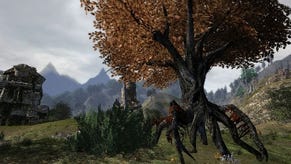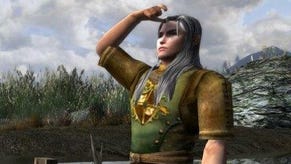The Lord of the Rings Online: Mines of Moria
There's too much panic in this town.
It's very hard to build the momentum of a storyline within an MMO these days, mostly because it's very hard to convince several thousand people to follow a straight line, let alone a cogent narrative. The Lord of the Rings Online solved this with solo instances and an almost unavoidable series of quests, and first expansion Mines of Moria continues this trend, insisting you follow the intricate narratives of Turbine's Tolkien interpretation.
Is this a good thing? Well, yes, if you like a good story, a real adventure, and playing an MMORPG that super-glues those last three letters to itself. If you really want to grind yourself into a thin paste, or don't find the Lord of the Rings storyline that enthralling, then Moria is in no way going to save your soul. In fact, it'll most likely annoy you as you romp over hill and dale, or, in this case, into the ruined halls of Khazad-Dum, the seat of the Dwarven empire and one of the most intricately built MMO environments ever made.
You see, the inside of Moria dwarfs (this is not, and never shall be a pun) almost every other game out there. Gigantic, Mount Rushmore-style dwarven faces loom out of the side of cliffs, huge staircases lead down equally gargantuan drops; there's an utterly bewildering and ominous feeling to the environment. It certainly packs the awe-inspiring effect of Wrath of the Lich King's Northrend, but it feels different - instead of feeling as if there's a great world of wonder ahead of you, Turbine has succeeded in creating a foreboding and hostile expanse. Caves - and the attendant darkness - stretch off into infinity, and around every corner seems to be some new nook or cranny that's filled with Goblins, Orcs, or hostile fauna.
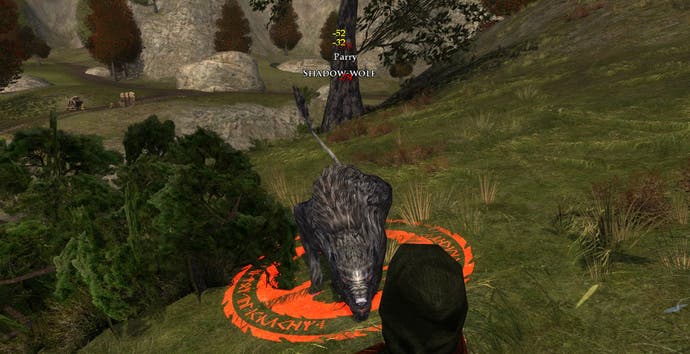
It's really not a comfortable world - in contrast to the relative frolicking of some of LOTRO's first volume, Shadows of Angmar - and it recreates an Everquest-esque unease, that feeling that you're most likely going to get stomped around the next corner. This is actually rather accurate, as more often than not you'll find yourself against odds that are not particularly favourable to your average solo player. This isn't an expansion for the bumbling, soloing explorer - the cramped conditions and bunching-together of hostiles leads to deaths both hilarious and unfortunate. If it's not falling off a staircase into a pile of Deepclaw, it's falling arse-over-tit off of the Endless Stair and dropping for what feels like an eternity to your death. I'll be honest - Moria is a harsher mistress than most.
This is far from a bad thing, though. Partied with just one other adventurer, you'll find the lands far easier to traverse, and the quests much easier to conquer. Instances range from your average yet fun dungeon-crawl to ceremonious moments of excellence, such as the historic instances (a cunning plot device to let LOTRO players battle classic monsters both now, and in future expansions). These let you not only see the history of Moria, but battle Durin's Bane himself. Or is it itself? I'm not sure Gandalf got the chance to check.
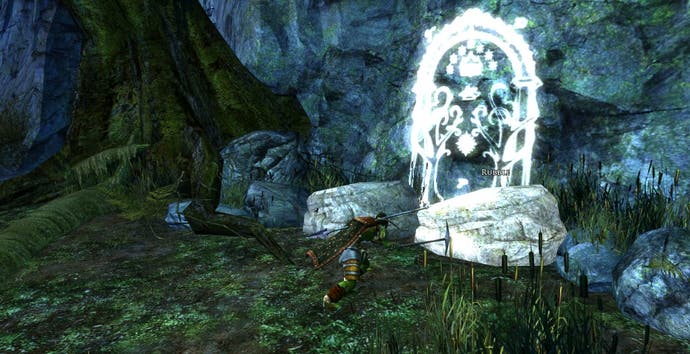
As with many expansions, LOTRO caters to the higher-level crowd, but Turbine has added two extra classes for any souls you drag into the gaping maw of gaming's most addictive genre. The Runekeeper is the lore-sundering product of Turbine's most creative minds, using "runes" (magic) to cast spells that are either damaging or restorative, each one pushing a reticule towards either destructive of constructive magic. As you gain weight in either side, its spells become more powerful and the other side less effective. Eventually, in the longer-term battles, your Runekeeper can adapt into an effective healer or remarkable damage-dealer, but you'll find little or no ability to perform the opposite role. It's a class that rewards careful attention to the way that the battle is heading - it's not impossible to change direction mid-battle, but it's much more fun when you fully specialise in one side.
The Warden is more of a thinking man's brawler and a light-armour tank. You queue up attacks, each combination creating a different effect once unleashed as a gambit. To use layman's terms, it's a bit like a fighting game, with each move being a punch and a kick. The complexity comes when the Warden is able to erase strings of combos mid-fight, and eventually chop and change single moves. Their gambits range from healing themselves, to damaging attacks, to taunting abilities - and the variation comes from your ability to time your gambits with (much like the Runekeeper's balancing of damage and healing) the flow of the battle.
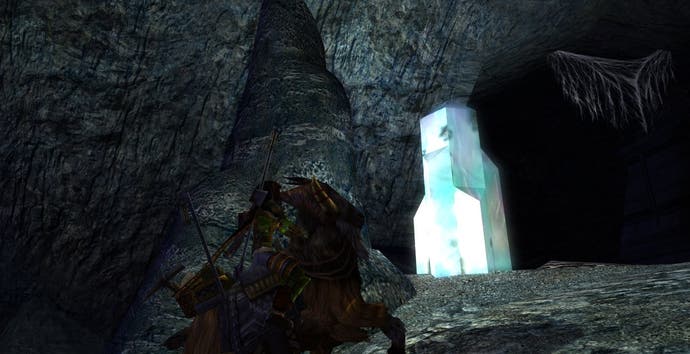
These classes succeed in maturing as you level beyond raw abilities, too - when battles start lasting more than 10-15 seconds each, and real tactics get involved, both the Warden and the Runekeeper come into their own. They're well-realised and implemented, and they'll be a big help to groups when played by competent gamers.
The final - and most interesting - addition with Moria is the Legendary Weapon system. As you progress through the various caverns and ruins, you'll pick up the pieces of Old World weaponry that can be taken to various Forgemasters and turned Legendary. These become levellable weapons, with separate experience and skill pools, as well as places to put item upgrades. They each have 30 levels, which aren't particularly gruelling to grind through, but you can level multiple items at the same time. They're remarkably individual even a few levels in, with the ability to actively change the build of your character depending on how you've levelled them.
Moria is an evolutionary expansion in which Turbine has honed what it does best: storytelling, an enjoyable, constantly changing levelling curve, and atmosphere in big, rocky buckets. It won't convert anybody, nor win back anybody who grew tired of the semi-linearity of the LOTRO storyline - but if you're desperate to follow the trail of the Fellowship and see what exactly made the dwarves such moaners, or just continue your online Ringbearing, then Moria is an absolute joy. With Volume Two, Turbine has created a harmonious, tight and seamless addition to the LOTRO game-world, and one that will no doubt lead into another year's successful expansion.


